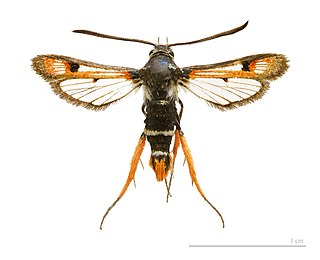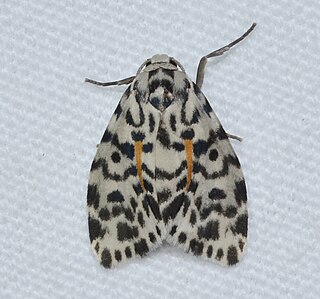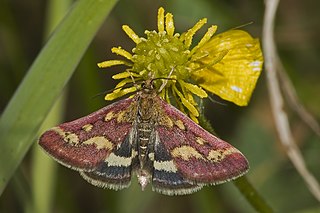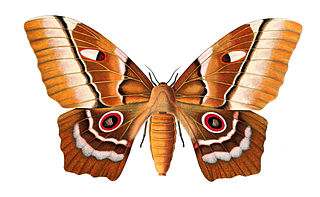
Sesioidea is a superfamily containing clearwing moths (Sesiidae), castniid moths (Castniidae) and little bear moths (Brachodidae). There is evidence from head and thoracic morphology that the first two families, internally feeding in plants as caterpillars, are sisters, whilst some brachodids are known to feed on leaf surfaces. Sesioidea is closely related to Cossoidea, which contains the also internal-feeding Goat and Leopard moths, and recent taxonomic treatments consider the sesioid families as part of Cossoidea sensu lato.

Gracillariidae is an important family of insects in the order Lepidoptera and the principal family of leaf miners that includes several economic, horticultural or recently invasive pest species such as the horse-chestnut leaf miner, Cameraria ohridella.

Clemensia is a genus of moths in the family Erebidae. The genus was described by Packard in 1864.
Eriomastyx is a genus of moths in the family Erebidae. The genus was erected by Rothschild and Jordan in 1905.

The Obtectomera is a clade of macro-moths and butterflies, comprising over 100,000 species in at least 12 superfamilies. This clade was initially defined by a pupal stage with the four anterior abdominal segments fused and immobile as the sole synapomorphy, but was later revised to include the modification of the dorsal edge of the pulvillus with a protrusion in the adult.
Geniascota is a genus of moths of the family Erebidae. The genus was erected by George Hampson in 1926.

Micragrotis is a genus of moths of the family Noctuidae. The genus was erected by George Hampson in 1903.
Leguminivora is a genus of moths belonging to the subfamily Olethreutinae of the family Tortricidae.

Lantanophaga pusillidactyla, the lantana plume moth, is a moth of the family Pterophoridae. It is native to the southern United States, Mexico, the Caribbean, and South America.

Pseudimbrasia is a monotypic moth genus in the family Saturniidae described by Pierre Claude Rougeot in 1962. Its only species, Pseudimbrasia deyrollei, described by James Thomson in 1858, is found in the mid-latitudes of Africa.

Hymenia perspectalis, the spotted beet webworm moth, is a species of moth of the family Crambidae. It is found in various parts of the world, including North America, where it is found from Maine to Florida, west to Texas and north to Michigan and Ontario. It is also found in Belize, Hong Kong, Jamaica, Australia (Queensland), the Comoros, Equatorial Guinea, Réunion and South Africa. The species was described by Jacob Hübner in 1796.

Diaphone eumela, the cherry spot or lily borer, is a moth of the family Noctuidae. It is found in Lesotho, Mozambique, Namibia, South Africa and Angola.

Scopula minorata is a moth of the family Geometridae. It was described by Jean Baptiste Boisduval in 1833. It is found in Africa south of the Sahara, the Arabian Peninsula and on the islands of the Indian Ocean. Furthermore, it is found in southern Europe. It can be distinguished from Scopula lactaria only by examination of its genitalia.
Callisthenia lacteata is a moth of the subfamily Arctiinae first described by Arthur Gardiner Butler in 1878. It is found in the Amazon region.
Clemensia lacteata is a moth of the family Erebidae. It is found in Peru.
Pyncostola lacteata is a moth of the family Gelechiidae. It was described by Anthonie Johannes Theodorus Janse in 1950. It is found in Namibia.

Enchoria lacteata is a species of geometrid moth in the family Geometridae.
The Macroheterocera are a well supported clade of moths that are closely related to butterflies and macro-moths.









